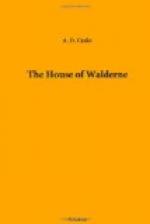“There they go together.”
“Two boys, each without a second name.”
“But after all,” said Louis, ’I like Hubert better for standing up for his friend.”
“They are queer friends, as unlike as light and darkness,” said Drogo.
“Talking of darkness reminds one of your eyes, they are—”
“Hold your tongue.”
And a new quarrel commenced, which we will not stop to behold, but follow the two into the woods; “older, deeper, grayer,” with oaks that the Druids might have worshipped beneath.
Chapter 4: In the Greenwood.
While they were in sight of the other boys Martin’s pride kept him from displaying any emotion, but when they were alone in the recesses of the woods, and Hubert, putting his hand on the other’s shoulder bade him “not mind them,” his bosom commenced to heave, and he had great difficulty in repressing his tears. It was not mere grief, it was the sense of desolation; he felt that he was not in his own sphere, and but for the thought of the chaplain would willingly have returned to the outlaws in the greenwood. No boy at a strange school feels as out of place as he, and the worst was, he did not get acclimatised in the least.
He had not found his vocation. Then again, he had been sweetly lectured upon his temper by Father Edmund, and had promised to control it. Still, was he to be switched by Drogo? He knew he never could bear it, and didn’t quite feel that he ought to do so.
“Hubert,” he said at last, “I don’t think I can stay here.”
“Why, it is a very pleasant place. I love it more every day, and they are not such bad fellows.”
“You are like them in your tastes, and I am not.”
“But tell me, Martin, how were you brought up; were you always with the outlaws? You almost let out the secret today.”
“Yes, I was born in the woods.”
“Then you are not of gentle blood?”
“That depends upon what you mean by gentle blood. I am not of Norman blood by my father’s side, although my mother may be, from whom I get my dark features: my father was descended from the old English lords of Michelham, who lived on the island for ages before the Conquest; my mother’s family is unknown to me.”
“Indeed! what became of your English forbears?”
“Robert de Mortain contrived their ruin, but dearly did his race pay for it in the justice of God. His ghost, or that of his son, still haunts Pevensey: but all that is past and gone. Earl Simon sometimes says (you heard him perhaps the other day) that the English are of as good blood as the Normans, and that he should be proud to call himself an Englishman.
“He is worthy of the name,” said Martin, and Hubert smiled; ’but it is not that—I want to be a scholar, and by and by a priest.”
“The very thing they wanted to make me, and I wouldn’t for the world; what a pity we could not change places. Ah! what is that?”




